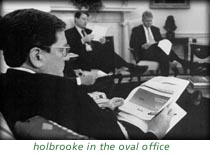 | 
Richard Holbrooke began his diplomatic career as a foreign service officer in
Vietnam during the early years of the U.S. involvement there. Holbrooke
participated in a pacification program in the Mekong Delta, which attempted to
bolster support for the South Vietnamese regime. He later was a staff
assistant to the U.S. Ambassador to South Vietnam.
In 1966 he returned to the U.S. and served as an advisor on Vietnam to
President Johnson and was the junior member of the American delegation to the
Paris peace talks in 1968. Holbrooke recalls that he did not question the
objectives of the U.S. intervention in Vietnam at the time but he did question
the methods employed. These methods, he believed, culminated in a military
quagmire and the eventual U.S. military defeat. In his interview with
FRONTLINE, he said, "The bombing [of North Vietnam] ... increasingly ... didn't
make much sense. ... I came to the conclusion ... that either we shouldn't be
doing it, or we should be doing it more effectively."
In the intervening years, Holbrooke has shuttled back and forth between private
sector and government positions. He was the Managing Editor of Foreign
Policy, a quarterly journal, as well as a contributing editor to
Newsweek magazine during the 1970s. During the 1980s he became a
successful consultant and investment banker. However, between those two
careers he spent approximately four years (1977-81) as Assistant Secretary of
State for East Asian and Pacific Affairs during the Carter Administration, and
has held a variety of paid and unpaid positions in the Clinton Administration,
including U.S. Ambassador to Germany (1993-94), Assistant Secretary of State
for European and Canadian Affairs (1994-96), and Chief U.S. Envoy to the former
Yugoslavia (1995 onward).
 It was through his involvement in the wars in Yugoslavia that Holbrooke
achieved his greatest fame, successfully negotiating the Dayton Peace Accords
which ended the Bosnia war. Before and during the negotiation, Holbrooke
advocated "bombs for peace," or the selective, limited application of U.S.
military power to convince hostile parties to agree to a settlement. The
bombing did contribute to forcing the Bosnian Serbs to the negotiating table.
However, Holbrooke notes the irony of his journey from one who was deeply
distrustful of using limited military force to achieve a diplomatic settlement
in Vietnam to one who has advocated exactly that tactic in Bosnia and, most
recently, Kosovo. It was through his involvement in the wars in Yugoslavia that Holbrooke
achieved his greatest fame, successfully negotiating the Dayton Peace Accords
which ended the Bosnia war. Before and during the negotiation, Holbrooke
advocated "bombs for peace," or the selective, limited application of U.S.
military power to convince hostile parties to agree to a settlement. The
bombing did contribute to forcing the Bosnian Serbs to the negotiating table.
However, Holbrooke notes the irony of his journey from one who was deeply
distrustful of using limited military force to achieve a diplomatic settlement
in Vietnam to one who has advocated exactly that tactic in Bosnia and, most
recently, Kosovo.
Holbrooke currently is President Clinton's nominee to be the U.S. Ambassador to
the United Nations.

home +
smith & holbrooke +
uses of military force +
nation building +
lessons of vietnam
chronology +
discussion +
synopsis +
press +
tapes & transcripts
frontline +
pbs online +
wgbh
web site copyright WGBH educational foundation
|  |